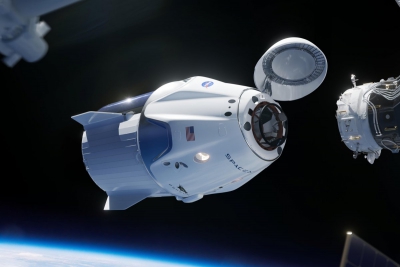Gemini 10 (officially Gemini X) was a 1966 crewed spaceflight in NASA's Gemini program. It was the 8th crewed Gemini flight, the 16th crewed American flight, and the 24th spaceflight of all time (includes X-15 flights over 100 kilometers (54 nautical miles)). During the mission, flown by John Young and future Apollo 11 Command Module Pilot Michael Collins, Collins became the first person to perform two extravehicular activities.
Human spaceflight (also referred to as manned spaceflight or crewed spaceflight) is spaceflight with a crew or passengers aboard a spacecraft, often with the spacecraft being operated directly by the onboard human crew. Spacecraft can also be remotely operated from ground stations on Earth, or autonomously, without any direct human involvement. People trained for spaceflight are called astronauts (American or other), cosmonauts (Russian), or taikonauts (Chinese); and non-professionals are referred to as spaceflight participants or spacefarers.The first human in space was Soviet cosmonaut Yuri Gagarin, who launched on 12 April 1961 as part of the Soviet Union's Vostok program. This was towards the beginning of the Space Race. On 5 May 1961, Alan Shepard became the first American in space, as part of Project Mercury. Humans traveled to the Moon nine times between 1968 and 1972 as part of the United States' Apollo program, and have had a continuous presence in space for 21 years and 144 days on the International Space Station (ISS). As of 2021, humans have not traveled beyond low Earth orbit since the Apollo 17 lunar mission in December 1972.
Currently, the United States, Russia, and China are the only countries with public or commercial human spaceflight-capable programs. On 15 October 2003, the first Chinese taikonaut, Yang Liwei, went to space as part of Shenzhou 5. Non-governmental spaceflight companies have been working to develop human space programs of their own, e.g. for space tourism or commercial in-space research. The first private human spaceflight launch was a suborbital flight on SpaceShipOne on June 21, 2004. The first commercial orbital crew launch was by SpaceX in May 2020, transporting, under United States government contract, NASA astronauts to the ISS.

1966Jul, 18
Human spaceflight: Gemini 10 is launched from Cape Kennedy on a 70-hour mission that includes docking with an orbiting Agena target vehicle.
Choose Another Date
Events on 1966
- 10Mar
Buddhist Uprising
Military Prime Minister of South Vietnam Nguyễn Cao Kỳ sacked rival General Nguyễn Chánh Thi, precipitating large-scale civil and military dissension in parts of the nation. - 6Jul
Hastings Banda
Malawi becomes a republic, with Hastings Banda as its first President. - 10Jul
Martin Luther King, Jr.
The Chicago Freedom Movement, led by Martin Luther King, Jr., holds a rally at Soldier Field in Chicago. As many as 60,000 people attend. - 14Oct
Montreal Metro
The city of Montreal begins the operation of its underground Montreal Metro rapid transit system. - 8Nov
Reconstruction Era
Former Massachusetts Attorney General Edward Brooke becomes the first African American elected to the United States Senate since Reconstruction.

 English
English  español
español  français
français  português
português  русский
русский  العربية
العربية  简体中文
简体中文 